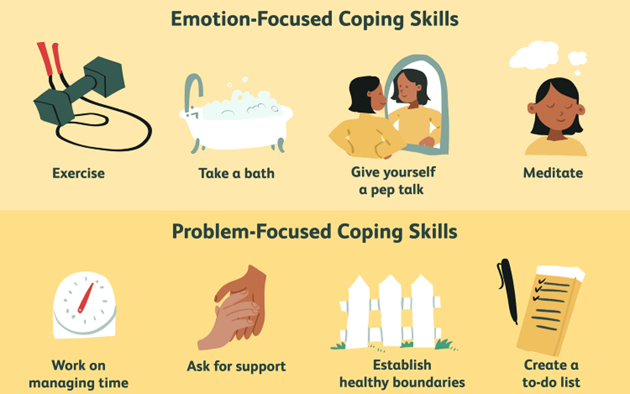A client with depression does not want to communicate with friends, uses television watching as a means of escaping responsibilities, and describes the inability to handle personal circumstances. Which coping strategy should the nurse include in the plan of care?

Concentrate on and ventilate emotions when distressed.
Shift attention from self to the needs and requests of others.
Relax and reduce the amount of effort to solve the problem.
Focus on small achievable tasks, not taxing problems.
The Correct Answer is D
Choice A Rationale:
While emotional expression and ventilation can be therapeutic, it may not be the most appropriate coping strategy for someone with depression who may already be overwhelmed by negative emotions. Ventilating emotions without a structured approach might not provide the desired relief and can even exacerbate feelings of distress.
Choice B Rationale:
This choice may not be suitable for someone with depression because it could lead to further neglect of their own needs and contribute to feelings of guilt or exhaustion.
Choice C Rationale:
While relaxation techniques can be helpful, reducing the effort to solve problems may not be the most effective strategy for individuals with depression. Avoidance of problems can perpetuate feelings of helplessness and hopelessness.
Choice D Rationale:
For a client with depression who is struggling with handling personal circumstances, focusing on small achievable tasks can be a helpful coping strategy. Breaking down larger problems into manageable steps can reduce feelings of overwhelm and gradually improve the client's sense of accomplishment and self-efficacy.
Nursing Test Bank
Naxlex Comprehensive Predictor Exams
Related Questions
Correct Answer is A
Explanation
Choice A rationale:
Exploring changes in life that have occurred after the loss is the first action the nurse should take. This allows the nurse to assess the client's grief, identify specific stressors, and understand how the loss is impacting the client's daily life and emotional well-being. It provides valuable information for tailoring further interventions and support.
Choice B rationale:
Suggesting the need for a psychiatric consultation may be premature as the nurse should first assess the client's grief and coping mechanisms. Referral for psychiatric consultation should be considered if the client's emotional distress is severe, persistent, or significantly impacting their functioning.
Choice C rationale:
Offering a referral to pastoral counseling may be appropriate for some clients, but it should not be the first action. The nurse should assess the client's needs and preferences before making such a referral.
Choice D rationale:
Encouraging attendance at a local support group can be beneficial, but it should not be the initial step. The nurse should first assess the client's current emotional state and needs to determine the most appropriate interventions.
Correct Answer is C
Explanation
Choice A rationale:
Preoccupation typically involves excessive thoughts or worries about a particular topic and may not directly manifest as physical symptoms like numbness and tingling.
Choice B rationale:
Reexperience often refers to the reliving of traumatic events through flashbacks or intrusive memories and is more closely associated with conditions like post-traumatic stress disorder (PTSD).
Choice C rationale:
Somatization refers to the expression of psychological distress through physical symptoms. In this case, the client's numbness and tingling on the right side of the body may be somatic symptoms related to the psychological distress and grief experienced after the spouse's death.
Choice D rationale:
Disorganization is not typically associated with physical symptoms like numbness and tingling. It may relate to cognitive or emotional difficulties but not to these specific physical sensations.
Whether you are a student looking to ace your exams or a practicing nurse seeking to enhance your expertise , our nursing education contents will empower you with the confidence and competence to make a difference in the lives of patients and become a respected leader in the healthcare field.
Visit Naxlex, invest in your future and unlock endless possibilities with our unparalleled nursing education contents today
Report Wrong Answer on the Current Question
Do you disagree with the answer? If yes, what is your expected answer? Explain.
Kindly be descriptive with the issue you are facing.
